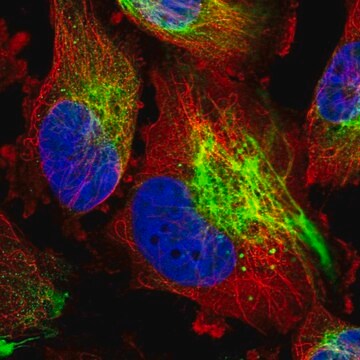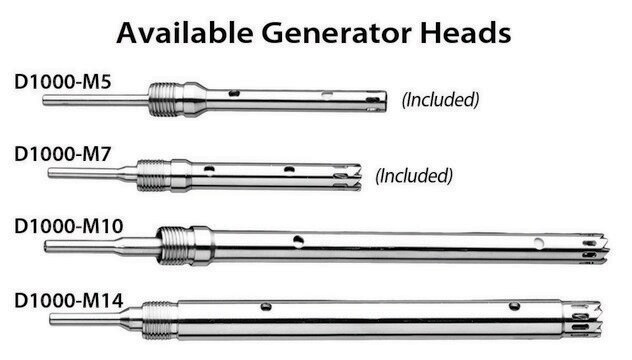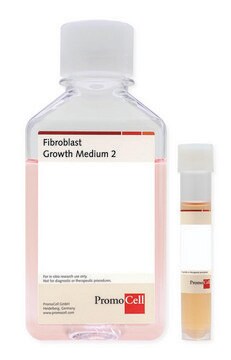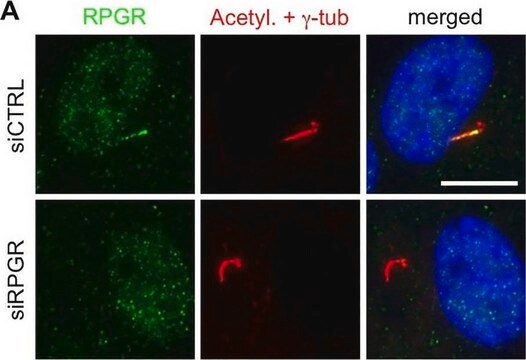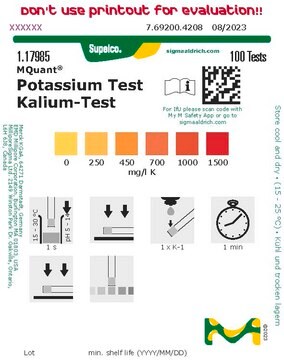추천 제품
생물학적 소스
rabbit
결합
unconjugated
항체 형태
affinity isolated antibody
항체 생산 유형
primary antibodies
클론
polyclonal
제품 라인
Prestige Antibodies® Powered by Atlas Antibodies
양식
buffered aqueous glycerol solution
종 반응성
human
기술
immunofluorescence: 0.25-2 μg/mL
immunohistochemistry: 1:200-1:500
면역원 서열
YHQLKDITLGTLGYGENEDNRIGLKVCKQHYKKGTMFPSNETLNIDNDVELDCVQLDLQDLSKKPPDWKNSSFFRLEFYR
UniProt 수납 번호
배송 상태
wet ice
저장 온도
−20°C
타겟 번역 후 변형
unmodified
유전자 정보
human ... MCOLN2(255231)
일반 설명
The gene MCOLN2 (mucolipin-2) is mapped to human chromosome 1p22.3. It is a member of the TRP (transient receptor potential) superfamily of non-selective cation channels. The protein localizes at the plasma membrane.
면역원
Mucolipin-2 recombinant protein epitope signature tag (PrEST)
애플리케이션
All Prestige Antibodies Powered by Atlas Antibodies are developed and validated by the Human Protein Atlas (HPA) project and as a result, are supported by the most extensive characterization in the industry.
The Human Protein Atlas project can be subdivided into three efforts: Human Tissue Atlas, Cancer Atlas, and Human Cell Atlas. The antibodies that have been generated in support of the Tissue and Cancer Atlas projects have been tested by immunohistochemistry against hundreds of normal and disease tissues and through the recent efforts of the Human Cell Atlas project, many have been characterized by immunofluorescence to map the human proteome not only at the tissue level but now at the subcellular level. These images and the collection of this vast data set can be viewed on the Human Protein Atlas (HPA) site by clicking on the Image Gallery link. We also provide Prestige Antibodies® protocols and other useful information.
The Human Protein Atlas project can be subdivided into three efforts: Human Tissue Atlas, Cancer Atlas, and Human Cell Atlas. The antibodies that have been generated in support of the Tissue and Cancer Atlas projects have been tested by immunohistochemistry against hundreds of normal and disease tissues and through the recent efforts of the Human Cell Atlas project, many have been characterized by immunofluorescence to map the human proteome not only at the tissue level but now at the subcellular level. These images and the collection of this vast data set can be viewed on the Human Protein Atlas (HPA) site by clicking on the Image Gallery link. We also provide Prestige Antibodies® protocols and other useful information.
생화학적/생리학적 작용
PAX5 (paired box protein) is responsible for transcriptional activation of MCOLN2 (mucolipin-2). In presence of low extracellular sodium MCOLN2 channel activity increases. It is also involved in recycling of glycosylphosphatidylinositol (GPI)-anchored proteins. This occurs by transfer of proteins from recycling endosomes to the cell surface through the ARF6 (ADP-ribosylation factor 6)-associated pathway.
특징 및 장점
Prestige Antibodies® are highly characterized and extensively validated antibodies with the added benefit of all available characterization data for each target being accessible via the Human Protein Atlas portal linked just below the product name at the top of this page. The uniqueness and low cross-reactivity of the Prestige Antibodies® to other proteins are due to a thorough selection of antigen regions, affinity purification, and stringent selection. Prestige antigen controls are available for every corresponding Prestige Antibody and can be found in the linkage section.
Every Prestige Antibody is tested in the following ways:
Every Prestige Antibody is tested in the following ways:
- IHC tissue array of 44 normal human tissues and 20 of the most common cancer type tissues.
- Protein array of 364 human recombinant protein fragments.
결합
Corresponding Antigen APREST73221
물리적 형태
Solution in phosphate-buffered saline, pH 7.2, containing 40% glycerol and 0.02% sodium azide
법적 정보
Prestige Antibodies is a registered trademark of Merck KGaA, Darmstadt, Germany
면책조항
Unless otherwise stated in our catalog or other company documentation accompanying the product(s), our products are intended for research use only and are not to be used for any other purpose, which includes but is not limited to, unauthorized commercial uses, in vitro diagnostic uses, ex vivo or in vivo therapeutic uses or any type of consumption or application to humans or animals.
적합한 제품을 찾을 수 없으신가요?
당사의 제품 선택기 도구.을(를) 시도해 보세요.
Storage Class Code
10 - Combustible liquids
WGK
WGK 1
Flash Point (°F)
Not applicable
Flash Point (°C)
Not applicable
개인 보호 장비
Eyeshields, Gloves, multi-purpose combination respirator cartridge (US)
가장 최신 버전 중 하나를 선택하세요:
Guangbi Li et al.
American journal of physiology. Cell physiology, 317(3), C481-C491 (2019-07-04)
The transient receptor potential mucolipin 1 (TRPML1) channel has been reported to mediate lysosomal Ca2+ release that is involved in Ca2+-dependent lysosome trafficking and autophagic flux. However, this regulatory mechanism of lysosomal TRPML1 channel activity in podocytes remains poorly understood.
Christian Grimm et al.
The Journal of biological chemistry, 287(27), 22701-22708 (2012-07-04)
The transient receptor potential channels TRPML2 and TRPML3 (MCOLN2 and MCOLN3) are nonselective cation channels. They are widely expressed in mammals. However, little is known about their physiological function(s) and activation mechanism(s). TRPML3 can be activated or rather de-inhibited by
David A Zeevi et al.
Journal of cell science, 123(Pt 18), 3112-3124 (2010-08-26)
The mucolipin (TRPML) subfamily of transient receptor potential (TRP) cation channels consists of three members that play various roles in the regulation of membrane and protein sorting along endo-lysosomal pathways. Loss-of-function mutations in TRPML1 cause the neurodegenerative lysosomal storage disorder
David A Zeevi et al.
Biochimica et biophysica acta, 1772(8), 851-858 (2007-02-20)
Mucolipin 1 (MLN1), also known as TRPML1, is a member of the mucolipin family. The mucolipins are the only lysosomal proteins within the TRP superfamily. Mutations in the gene coding for TRPML1 result in a lysosomal storage disorder (LSD). This
Claudia Karacsonyi et al.
Traffic (Copenhagen, Denmark), 8(10), 1404-1414 (2007-07-31)
In mammals, the mucolipin family includes three members mucolipin-1, mucolipin-2, and mucolipin-3 (MCOLN1-3). While mutations in MCOLN1 and MCOLN3 have been associated with mucolipidosis type IV and the varitint-waddler mouse phenotype, respectively, little is known about the function and cellular
자사의 과학자팀은 생명 과학, 재료 과학, 화학 합성, 크로마토그래피, 분석 및 기타 많은 영역을 포함한 모든 과학 분야에 경험이 있습니다..
고객지원팀으로 연락바랍니다.